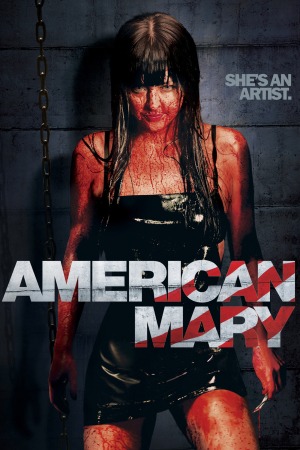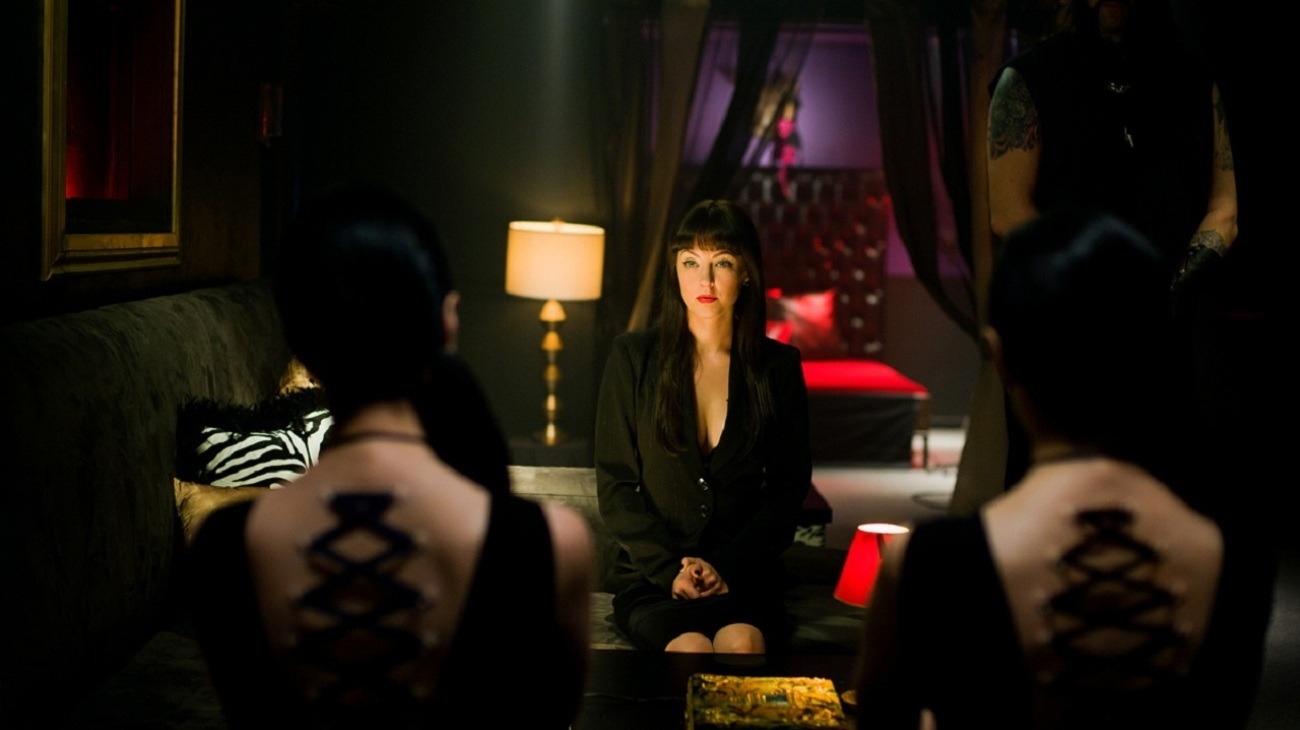
There's something about Mary
The Canadian indie horror film American Mary is good enough that I wish it were better. That's a weird way of phrasing what's meant to be a statement of praise; but American Mary is a weird movie. It's the second feature by filmmaking twins Jen and Sylvia Soska, following the 2009 Dead Hooker in a Trunk, which I have not seen, though I have a sneaking suspicion I can guess what it's about; their production company is named Twisted Twins, which sounds about right. On the evidence of this sophomore effort, I'd describe them as having pretty terrific instincts, and a great sense for how to make the viewer twist and squirm though unnerving concepts carried through unfussy, brutalising images. And I'd also describe them as suffering from that common screenwriter's ailment, Can't Write a Third Act syndrome.
What they can write, though, is a hell of a character. That character being, of course, Mary: Mary Mason, to be precise, a medical student training to be a surgeon, vividly played by Katharine Isabelle as a sardonic idealist who is a little bit shocked to discover about herself that she has virtually no ethical scruples when the possibility of making money raises its head. Though even putting it that way begs the question: defining "ethical scruples" in the context of American Mary would require making assumptions that the film never asks you to make, and in some cases specifically proscribes.
Which is both the extremely refreshing and boldest part of the movie, and also the most weirdly misfiring and self-defeating. I guess I need to talk about the content of the film if I want to go any further: Mary is broke as all hell, you see, and the job where she scrambles to make enough to keep the lights on and the bill collectors angry and impatient but at arm's length winks out of existence soon into the movie. Depressed and at the end of her tether, Mary heads to look for work at the local strip club, but gets a different job offer than the one she expected: the club owner, Billy Barker (Antonio Cupo) has a badly beaten human body in the back, and he's looking to spend $5000 to have somebody with surgical training and a willingness to ask absolutely no questions whatsoever patch that body up, presumably for more beatings. This Mary does, with surprisingly little moral handwringing - some, of course, but $5000 is a titanic sum of money given her current situation.
The real fun begins when one of the strippers comes calling a little while later: this is a certain Beatress Johnson (Tristan Risk), who has invested quite a gigantic sum of money into body modification surgery to make herself look and sound as much as a physically functioning human being can to the grossly dysmorphic '30s cartoon character Betty Boop. She doesn't want Mary to help her along that path any more; she's actually look for help for a friend of hers, Ruby Realgirl (Paula Lindberg), a body modification enthusiast with less resources than Beatress herself, who wants more than anything to resemble a human Barbie doll. For the kingly sum of $10,000, all Mary has to do is remove Ruby's nipples and sew up her vagina. Reasoning that her patient is an adult capable of making decisions on her own, Mary acquiesces even more quickly than she did with the victim in the strip club's back room.
This is enough to make Mary a celebrity surgeon in the body modification underground, and American Mary spends the great majority of its running time playing around with the ramifications of that, considering the sort of weird things that such a person might be asked to do. The really remarkable thing is that the Soskas (who cameo as twins and probably lovers who ask for a few things that don't include being conjoined, which caught me off guard) don't offer up even an iota of judgment for the world they're depicting, and only a very little bit for Mary's gross violations of professional ethics in contributing to that world. So while we might be tempted to file this away under the "body horror" label, it's not really horrifying.
And this actually causes the film some issues, because it dearly wants to figure out a way to make Mary a mad scientist, drunk with her newfound power and money, and build a downfall for her. This is achieved in part by splicing in a subplot that mostly works and then ceases to as it goes on: in one of her classes, Mary is taught by a supercilious, condescending ass named Dr. Grant (David Lovgren). It's worth noting that everything he says is true, and Mary knows it; it's the vicious, sarcastic, leering way he says it that tips us off from the first scene that this guy is a huge problem. And lo and behold, he eventually invites Mary to a party with the single intention of drugging and raping her. Mary's revenge is blunt and immediate: she kidnaps Grant and makes him the canvas for her most extreme modification experiments. And this is horrifying, and the delayed reveal of just what shape Grant has come to is maybe the single most viscerally upsetting image I've seen in a horror movie in the 2010s. But that doesn't change how artificial the rape revenge subplot feels at all turns, like the Soskas were somehow aware that they hadn't built in a mechanism to demonstrate Mary's inability to distinguish right from wrong and needed to have her do something that was thus awful.
After all, the title makes it clear that this is an assault on something. Greed? The amorality of money? It's hard to say, but you don't put "American" in a title if that's not your intent, even if you're Canadian. Thankfully, it's not belabored at all; though this is in no small part because the film simply can't round the corner on Mary's downfall character arc. We have this very broad-minded depiction of a subculture; we have a revenge horror flick; we have a twist ending that makes sense logically but not dramatically and seems to exist only to depict Mary getting her comeuppance for sins that the movie didn't demonstrate as being all that sinful in the first place. And somewhere in all of that, the protagonist goes from being a charmingly innocent young woman to a callous femme fatale whose acidic wit makes her seem aloof and merciless even when she's being nice. Isabelle does her absolute damnedest to sell this, and her performance is committed enough to make it work on a scene-by-scene basis (it's a seriously great performance, not only by genre standards but by normal, everyday film standards), but it still feels like two or three scenes in the middle have to be missing, where we actually see Mary's morals start to slip.
For all the dramatic slip-ups, the film is still intensely memorable and effective, for the Soskas know how to come up with an unforgettable image. It is admittedly the case that the images are more mind-blowing for their content than because of they way they've been filmed; in fact, the film relies to an irritating degree on a certain industrial-grey lighting scheme that feels like it dates from the 1990s, and the overreliance on stock medium shots robs some moments of their impact (the reveal of Ruby's body, which actually comes quite late in the film, is a particularly unexceptional moment that feels like it shouldn't have been). But the imagination of the body modification, and the filmmakers' directness in depicting it, is intoxicatingly vivid. At the risk of gendering things, there's a distinctively feminine sensibility to how the film emphasies sexuality and body identity without being terrified of it, and for a genre as repelled by strong female sexual impulses as horror, that's quite an achievement already. The inherent conservatism of the form still shows itself in that oddly misguided finale, with its punishment of kinksters and "deviants", but the horror world could use more voices like these even so. Enough of American Mary is truly impressive that I'm pretty confident the Soskas have something outright great in them, if they can refine their talents and instincts just a bit more.
6/10
Categories: canadian cinema, horror, tampering in god's domain






